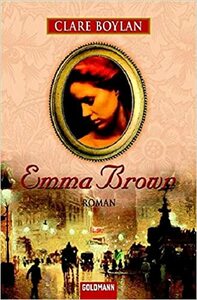Take a photo of a barcode or cover
It was alright but not what I'd have expected. I think Bronte would have revised and finished differently.
A little Bronte, a little Dickens....a delicious read. Enormously satisfying.
What a read! If you love Charlotte Bronte you must read this book. Could not put it down!!
Before she died, Charlotte Bronte wrote two chapters of a novel called "Emma Brown". Clare Boylan finishes it off in this well done historical novel. Is it written in Charlotte Bronte's "voice"? Not sure. But was it a good read? Absolutely. Lots of fun to be had here, despite the many descriptions of consumptive children, piles of rags that turn into dead babies, child slavery, and near starvation. There's a mystery child/young woman and a man who isn't her father (that's not a spoiler), hard-hearted school-mistresses, a virtuous widow with an interesting past, a well-liked middle-aged man with another interesting past, a crusading journalist with roots in the aristocracy and perhaps a lack of empathy toward those in his personal life, and plenty of fallen women, Dickensian villains, poor men with hearts of gold, and last minute disappearances and rescues. Good stuff.
This book has an interesting premise of using the uncompleted manuscript entitled "Emma," by Charlotte Bronte, as the first two chapters of the book. Boylan also incorporates another partial writing about the character "Willie Ellin," as well as quotations from Bronte's other documents to create her story. It makes for an interesting mystery tale of who the title character is and what her background is, while examining some societal issues of the time period.
Not a Brontë book, and I didn't care for the direction Boylan was taking.
When Charlotte Brontë died, she left 20 pages of a novel behind. Clare Boylan decided to finish it. A little girl is enrolled in a private girls' academy. She is shy and reclusive, but the headmistresses make much of her because it's obvious that her benefactor has money. Trouble arises when her benefactor can't be found and the girl can't--or won't--tell anyone anything about herself.
I have to say that this novel stayed true to the whole Gothic, melodramatic feel that I associate with the Brontës. There were all kinds of improbable twists, turns, loops, and coincidences. Boylan was much more explicit than Charlotte Brontë could have been. Not that she was explicit, it just seems that some things weren't referred to, even obliquely, in those times. I did pick out where Charlotte left off and Boylan took over, but I was pleasantly surprised by how well it did all fit together.
There were a lot of chapters covering the back stories of the supporting characters. They were absolutely necessary, but since I didn't know that until the end, I was mostly frustrated and wishing I could get on with the "real" story.
I would have rated this a little higher if I could have liked Emma a little better. But I really, really didn't like her. She was all "Woe is me!" and "All is ashes." She kept going though, through all her troubles, so I had to admire her for that, but would a smile really have killed her? And her world view was stark black and white. She did not see or acknowledge any shade of gray. She was very unforgiving and intolerant. If this character had been written in Jane Eyre's place, she would never have forgiven Mr. Rochester for lying about his marriage and that would have been the end of that.
But I did like Isabel Chalfont. Her life was never easy either, but she made the best of it, learned what she could, found happiness where she could, and tried not to dwell too much on things she couldn't change.
I think fans of the Brontës, who have read all their work and wish they could read more, will actually like this. Just don't expect anything other than doom and gloom from Emma.
I have to say that this novel stayed true to the whole Gothic, melodramatic feel that I associate with the Brontës. There were all kinds of improbable twists, turns, loops, and coincidences. Boylan was much more explicit than Charlotte Brontë could have been. Not that she was explicit, it just seems that some things weren't referred to, even obliquely, in those times. I did pick out where Charlotte left off and Boylan took over, but I was pleasantly surprised by how well it did all fit together.
There were a lot of chapters covering the back stories of the supporting characters. They were absolutely necessary, but since I didn't know that until the end, I was mostly frustrated and wishing I could get on with the "real" story.
I would have rated this a little higher if I could have liked Emma a little better. But I really, really didn't like her. She was all "Woe is me!" and "All is ashes." She kept going though, through all her troubles, so I had to admire her for that, but would a smile really have killed her? And her world view was stark black and white. She did not see or acknowledge any shade of gray. She was very unforgiving and intolerant. If this character had been written in Jane Eyre's place, she would never have forgiven Mr. Rochester for lying about his marriage and that would have been the end of that.
But I did like Isabel Chalfont. Her life was never easy either, but she made the best of it, learned what she could, found happiness where she could, and tried not to dwell too much on things she couldn't change.
I think fans of the Brontës, who have read all their work and wish they could read more, will actually like this. Just don't expect anything other than doom and gloom from Emma.
I started this book with trepidation. Often, works based off of unfinished manuscripts are horrible. The worst of the genre being those that just recycle characters and plot points from other works by the same author.
Thus, I was pleasantly surprised by how Boylan took 20 pages of a manuscript from Charlotte Bronte and wrote a story that was all her own and highly entertaining in its own right. The first chapter from Boylan was a bit of an abrupt transition. As the story gained in momentum though, Boylan found her own rhythm and voice that was reminiscent of Bronte without being derivative or fake.
All in all, I really enjoyed this and would have been quite happy to read it even without the Bronte connection.
Thus, I was pleasantly surprised by how Boylan took 20 pages of a manuscript from Charlotte Bronte and wrote a story that was all her own and highly entertaining in its own right. The first chapter from Boylan was a bit of an abrupt transition. As the story gained in momentum though, Boylan found her own rhythm and voice that was reminiscent of Bronte without being derivative or fake.
All in all, I really enjoyed this and would have been quite happy to read it even without the Bronte connection.
Did not finish it...it was a fine book, just didn't draw me in enough to make me want to read it.
I really wanted to read the Charlotte Bronte passage.
Sadly, that's pretty much it.
See, I know that "Jane Eyre" had the irritating Helen Burns. But let me tell you, Helen Burns had nothing on the maudlin, tawdry Jenny Drew. She had all the insight and philosophy of "The Family Circus" (especially Grandpa's ghost! I love that guy!) and all the wit, too.
Ms Boylan makes a good effort here -- Charlotte Bronte is a lot to live up to, and it can't have been easy to try to seamlessly blend into the time period. The book, however, is sometimes jarringly modern (child prostitution?) and sometimes simperingly antiquated (the whole Crystal Palace scene makes "Great Expectations" seem gritty and clear-eyed). Basically, it doesn't work for me.
Sadly, that's pretty much it.
See, I know that "Jane Eyre" had the irritating Helen Burns. But let me tell you, Helen Burns had nothing on the maudlin, tawdry Jenny Drew. She had all the insight and philosophy of "The Family Circus" (especially Grandpa's ghost! I love that guy!) and all the wit, too.
Ms Boylan makes a good effort here -- Charlotte Bronte is a lot to live up to, and it can't have been easy to try to seamlessly blend into the time period. The book, however, is sometimes jarringly modern (child prostitution?) and sometimes simperingly antiquated (the whole Crystal Palace scene makes "Great Expectations" seem gritty and clear-eyed). Basically, it doesn't work for me.

